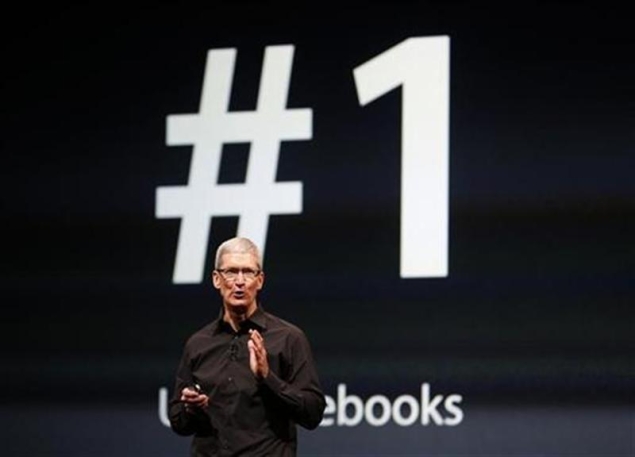- Home
- Mobiles
- Mobiles News
- Apple's softer side emerges under CEO Cook
Apple's softer side emerges under CEO Cook

That's what Steve Jobs reportedly told President Obama when asked at a dinner in early 2011 whether Apple would consider moving some of its manufacturing from China to the United States.
Jobs' successor, CEO Tim Cook, might have another response for Obama Yes, we can.
Though the metal edges of its PCs and mobile devices are as sharp and severe as ever, Apple is emerging under Cook's leadership as a kinder corporate citizen. Cook's announcement this week that the company is moving the production of one of its Mac computer lines to the U.S. is just the latest step in a softening of the company's image following the October 2011 death of CEO and co-founder Jobs.
"Cook is a gentler being in terms of how he projects himself," says Gartner analyst Carolina Milanesi. That's partly of necessity, she says people wouldn't tolerate Jobs' arrogance in a new CEO - but it's also a reflection of Cook's personality.
Cook didn't say which computers would be made in the U.S., or where the company might locate facilities. But bringing assembly-line jobs back to the U.S. lights a symbolic beacon of hope for working-class Americans who worry that the global economy has no use for them.
Cook's reforms have been both internal and outward-facing. Earlier this year, he visited the Chinese factories where Apple products are assembled, amid an Apple-financed audit of working conditions. Shortly after, Foxconn promised to limit working hours and raise wages.
U.S. workers are getting a better deal too. The Wall Street Journal reported in early November that the company will let some employees take up to two weeks of paid leave to work on pet projects that might benefit the company. The program is similar to a famous perk available to Google employees, who get to devote 20 percent of their time to entrepreneurial "hobbies."
In addition, the company now matches employee donations up to $10,000 a year. Tim Cook himself made $100 million in charitable donations early in the year, another contrast to Jobs, who had little interest in philanthropy.
Under Cook, Apple has also become more investor-friendly. Jobs, perhaps scarred by Apple's lean years in the 1990s, was opposed to Apple parting with its cash reserves. That lead to the company accumulating a rainy-day fund of nearly $100 billion in cash by the end of his tenure a hoard that investors would have liked for themselves.
This year, Apple has begun sharing its wealth with investors for the first time in two decades, by paying dividends of nearly $10 billion a year.
Cook's diplomacy has extended into enemy territory. Jobs was furious that phones running Google Inc.'s Android software mimicked Apple's iPhone so closely and vowed to wage "thermonuclear war" against the company through patent infringement lawsuits. The worldwide onslaught of litigation is still ongoing, but in early November, Apple agreed to a ceasefire on one front: It settled all its patent suits against Google partner HTC Corp., a struggling Taiwanese maker of smartphones.
The terms were not disclosed, but company watchers believe HTC will be paying Apple royalties on the phones it makes, and some saw it as a sign that Apple was taking a more rational stance and starting to put Jobs' take-no-prisoners fury behind it.
Carl Howe, an analyst with Yankee Group, says the image of a "softer" Apple that's emerged this year doesn't mean Cook is a softie.
"Make no mistake: he's not necessarily a kind, gentle guy if he needs to get something done. He's a very hard-nosed, demanding boss," Howe says. "And he's very much of the Steve Jobs model, where if you're the janitor you get to make excuses. If you're the vice president, you don't."
Cook, in fact, engineered a major shakeup in Apple's top ranks this fall. Scott Forstall, the long-serving head of iPhone software development, stepped down and his responsibilities were divided among other executives. Company watchers attributed his departure to difficulties collaborating with other departments and to the scathing reviews that greeted Apple's Maps application, which replaced Google Maps.
Another senior vice president left at the same time John Browett, who headed Apple's stores. Browett had tried to make his mark by cutting employee hours, leaving fewer people to help customers. Browett was overridden. He lasted just six months on the job.
"Being gentle and being a pushover are two different things," says Milanesi.
Catch the latest from the Consumer Electronics Show on Gadgets 360, at our CES 2026 hub.
Related Stories
- Samsung Galaxy Unpacked 2025
- ChatGPT
- Redmi Note 14 Pro+
- iPhone 16
- Apple Vision Pro
- Oneplus 12
- OnePlus Nord CE 3 Lite 5G
- iPhone 13
- Xiaomi 14 Pro
- Oppo Find N3
- Tecno Spark Go (2023)
- Realme V30
- Best Phones Under 25000
- Samsung Galaxy S24 Series
- Cryptocurrency
- iQoo 12
- Samsung Galaxy S24 Ultra
- Giottus
- Samsung Galaxy Z Flip 5
- Apple 'Scary Fast'
- Housefull 5
- GoPro Hero 12 Black Review
- Invincible Season 2
- JioGlass
- HD Ready TV
- Laptop Under 50000
- Smartwatch Under 10000
- Latest Mobile Phones
- Compare Phones
- Red Magic 11 Air
- Honor Magic 8 RSR Porsche Design
- Honor Magic 8 Pro Air
- Infinix Note Edge
- Lava Blaze Duo 3
- Tecno Spark Go 3
- iQOO Z11 Turbo
- OPPO A6c
- Lenovo Yoga Slim 7x (2025)
- Lenovo Yoga Slim 7a
- Lenovo Idea Tab Plus
- Realme Pad 3
- Moto Watch
- Garmin Quatix 8 Pro
- Haier H5E Series
- Acerpure Nitro Z Series 100-inch QLED TV
- Asus ROG Ally
- Nintendo Switch Lite
- Haier 1.6 Ton 5 Star Inverter Split AC (HSU19G-MZAID5BN-INV)
- Haier 1.6 Ton 5 Star Inverter Split AC (HSU19G-MZAIM5BN-INV)







![[Sponsored] Haier C90 OLED TV | Dolby Vision IQ, 144Hz OLED and Google TV in Action](https://www.gadgets360.com/static/mobile/images/spacer.png)









